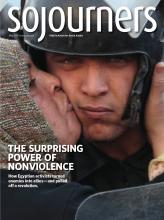Two years ago in Jordan, I met an Iraqi doctor whose father, a pastor, had recently been killed by Iraqi insurgents because he refused to close the doors of his Baghdad church. "It's God's church," the pastor told the rebels. "I can't close it." So they shot him and threatened to do the same to his son if the son didn't leave the country. The young doctor began his presentation with video footage of Iraqi citizens being lined up against a wall and executed.
I asked my Jordanian friends what they would say to Americans. "Pray for Iraqi citizens who are suffering," they said, "and care for refugees." They explained that Detroit has one of the the largest Arab populations outside of the Middle East and that many Arab refugees are now settling in the Chicago area as well. "Please welcome them."
The more than 4 million Iraqis who have been displaced in recent years have created one of the "largest humanitarian crises in the world today," according to Michael Kocher, a refugee expert at the International Rescue Committee. Millions of Iraqis who fled their homes to escape violence remain in desperate conditions in Iraq. Over 1.2 million more live in squalid camps or rundown neighborhoods in Jordan, Syria, and Lebanon.
As in most wars, women in Iraq have been uniquely victimized. In just the first four months of the war, 400 women and girls were abducted and raped. Armed groups target women in order to terrorize families and to force husbands, fathers, or brothers to yield to their demands. Sadly, the terror doesn't end when women flee the country.
Most Iraqi refugees don't have legal status in the countries to which they flee, so they can't work. Economic hardship leads to frustration and tension. Domestic violence is common. Even worse, widows who can’t feed their children are forced into prostitution.
Read the Full Article
